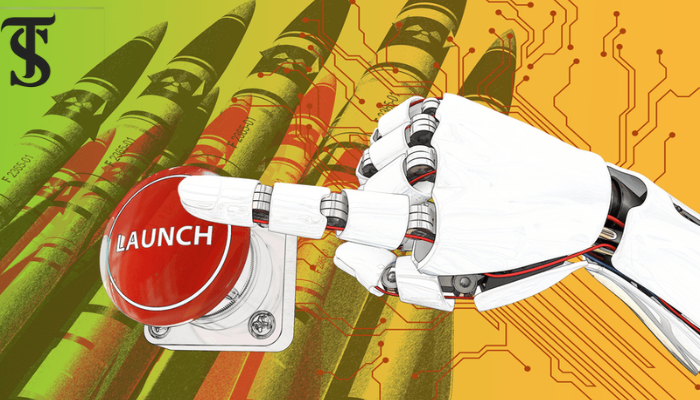Digital Terrorism: Why Pakistan is more Susceptible?

- Digital terrorism in Pakistan is exacerbated by the high unemployment and disillusionment among the youth, who often propagate anti-state narratives on social media.
- The EU Disinfo Lab revealed that fake accounts and ghost organizations, primarily from India, have been generating anti-Pakistan narratives, impacting international perceptions.
- Cyberattacks against Pakistan have surged, with significant incidents like the hacking of the Federal Board of Revenue's account, highlighting the urgent need for improved cybersecurity measures and digital skill development.
The fourth industrial revolution, with a focus on information and communication technology (ICT), is being witnessed by the modern epoch. The global paradigms of socio-political, economic, and security have been drastically transformed by the interwoven multinational society brought about by the rapid growth of technology. While these developments have given numerous chances for states to improve their status, globally, however they have also brought dangers to the world, one of which is digital terrorism.
Since the dawn of human civilization, people remain in fear for their lives, reputations, and possessions or to gain power. Their ultimate goal is to make them invincible, and to achieve that objective, they have fought millions of small- and large-scale battles. The approaches and tactics to curtail their rivals have remained in flux becuase of the changing social conditions and the rapid technological tranformation have aboslutely evoled the war and strategic strategies. Clausewitz, an imminent Prussian general sublimely epitomized the above discussion as: “Every age has its own kind of war, its own limiting conditions and its own peculiar preconceptions”.
According to a 2019 study titled “The Crises of Social Media,” the vast majority of Pakistani internet and mobile phone users utilize these platforms primarily for social media rather than for the acquisition of digital services.
Narrative building has become the prudunt weapon in both International Armed conflict (IAC) and Non International Armed Conflict (NIAC), owing to the revolutions in modern communication system. Misinterpiting facts or explaining various events without contextual refernces are the common means to launch a propoganda compaign against a state is ubiquitious in the contemporary world. Both state and non-state actors are vehemently using social media platforms to inculcate negative campaigns against state and state institutions to create rifts in the society. Pakistan is one of the victims of war propoganda also called digital terrorism as anti-state narratives are profoundly pulverizing state’s peace and security with every passing day.
Pakistan is one of the few countries in the world with the biggest youth bulge. The Pakistani government claims that youngsters make up over 60% of the total population. Unfortunately, according to United Nations Development Program (UNDP) figures in 2023, over 57% of youngsters without jobs do not even feel motivated to look for employment because they lack confidence in the government or in themselves. Conversely, according to OOSGA, a global data provider, over 73 million Pakistanis routinely use social media, with young people making up three-quarters of this population: majority of them are unemployed. They usually prolifirate anti-state narratives by attacking important state institutions, especially the security forces, on social media; an attempt to vent their resentment, which led to a growing mistrust between the state and its people. Unknowingly, both internal and external perpetrators frequently exaggerate their feelings and emotions, resulting into the fueking of digital terrorism against Pakistan.
Furthermore, the vast majority of our population are highly illiterate, and even those who do possess a basic level of literacy struggle to distinguish between good and evil because they lack critical thinking skills.

According to a 2019 study titled “The Crises of Social Media,” the vast majority of Pakistani internet and mobile phone users utilize these platforms primarily for social media rather than for the acquisition of digital services. Google also revealed the dark realities of our society: Harim Shah and Alizay Sahar among Pakistan’s most searched personalites in Pakistan, reflecting the country’s immature and wicked minds. Unfortunately, the myopic nature of our society, it’s an easy task to cultivate anti-state narratives on social media, the adversaries of the state successfully turn ordinary people against the state and its identity by making them skeptic about the ideological foundations and national cohesion. The majority of individuals aren’t even aware that they are being utilized as pawns by various entities in order to achieve their malicious goals.
A European based watchdog, EU Disinfo Lab has revealed in 2020, hundreds of fake accounts were working on the behest of India across 65 different counteries to generate anti pakistan narratives. Various international organizations like United Nations (UN), and the European Union (EU), and numerious influential states, such as the United States of America and the United Kingdom (UK), have all been impacted by the campaign because it was so effective and well-planned. As per the report numerous ghost think tanks and non-governmental organizations (NGOs) were also trying to defame Pakistan, internationally.

In the age of social media, misinformation and disinformation are also rampant, and governmental agencies are finding it increasingly difficult to keep up with these trends. By spreading unfavorable opinions about the state economy, the profiling of false information in society is exacerbating every day, increasing the vulnerability of state security. The United States of America (USA) is becoming more concerned about social media’s potential influence on the next presidential election, since both external and internal actors are constantly spreading false information to control the electoral processes. If the USA, the most technologically advanced country in the world, is having trouble fending off narrative war, what about less developed nations like Pakistan? The Information Minister and the Inter Services Public Relations (ISPR) have highlighted on varioius occasions about the threat posing by the flood of misinformation and disinformation via social media for the existence of Pakistan and the inevitability of non-conventional war agaist the digital terrorism.
Technology has made states more vulnerable to a wide range of new challenges, one of which is cyberwarfare. As highlighted by the Russian organization Kispersky, cyberattacks against Pakistan have surged by 17% in 2022. In an effort to undermine national security, thousands of Indian IT specialists are giving their utmost best to intercept the websites of important Pakistani institutions, for instance, an Indian hacker gained access to the Federal Board of Revenue’s (FBR) official account in 2022, stealing thousands of confidential documents and data in the process.
These are the contemporary threats which Pakistan is facing, commonly referred as digital terrorism; strangely, the populace is unwittingly aiding its enemies. to menace them, Pakistani authorities need to work on the digital skill development, so that youth can use their time and resource in a productive ways, rather remain prone to anti-state activites on social media. Moreover, formulation of an effective cyber-security regulations is the need of the hour to curb the flow of misinformation, without usurping the freedom of speech of people is also effective to combat the nuance potential peril digital terrorism.






6 Comments